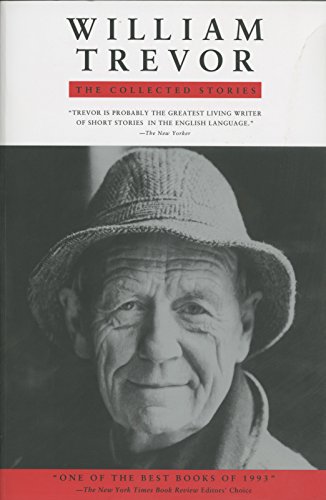Of all William Trevor’s stories, “Lovers of Their Time” might contain the single most pathetic moment of his entire oeuvre— which is a little like saying a certain Peckinpah film contains his single most violent scene or that a certain James Patterson book is the worst written. Difficult to choose with such stiff competition, but the rendezvous between Norman and Marie in the bathroom of the Great Western Royal Hotel would be tough to outstrip in terms of its almost—really, not almost—comic bleakness.
The year is 1963. Norman is a 40-year-old, unhappily married travel agent, and Marie is a 28-year-old drugstore clerk. Marie books a trip through Norman, the pretext upon which their affair begins. The affair is chaste for a very long time, an emotional entanglement consisting of drinks after work and kisses goodbye at Paddington Station. But the years go by, and London becomes Swinging London, and The Beatles supplant Elvis on the pub jukebox, and Norman, thus emboldened and possessed by the licentious zeitgeist, discovers a luxurious second-floor bathroom in the hotel adjoined to the train station. In this marble palace, Norman and Marie at last consummate their love. After months of these bathroom rendezvous, Norman tells his somewhat sex-crazed wife Hilda that he wants a divorce, and she laughs at him, telling him it will never work financially and proceeding to inform him of her various affairs. Norman and Marie do run away together, but just as Hilda predicted, it doesn’t work—Norman can’t afford his solicitor, and the unhappy couple has to move in with her mother, who despises him. Marie leaves him for a “man in a brewery”—it’s unclear whether this means a man who works in a brewery or a man who spends all his time there—and Hilda calls a chastened Norman home, telling him of her affairs in the meantime.
The thing that makes the ongoing bathroom romance so devastating is that it’s not merely pathetic but also incredibly poignant. Catching the train, Norman—older now, but still a travel clerk, still married to Hilda—reminisces about those moments with Marie as some of the greatest of his life:
For Norman Britt, as the decade of the 1960s passed, it trailed behind it the marvels of his love affair with Marie. Hilda’s scorn when he had confessed had not devalued them, nor had the two dirty rooms in Kilburn, nor the equally unpleasant experience in Reading. Their walk to the Great Western Royal, the drinks they could not afford in the hotel bar, their studied nonchalance as they made their way separately upstairs, seemed to Norman to be a fantasy that had miraculously become real. The second-floor bathroom belonged in it perfectly, the bathroom full of whispers and caressing, where the faraway places of his daily work acquired a hint of magic when he spoke to them to a girl as voluptuous as any of James Bond’s. Sometimes on the Tube he would close his eyes and with the greatest pleasure that remained to him he would recalled the delicately veined marble and the great brass taps, and the bath that was big enough for two. And now and again he heard what appeared to be the strum of distant music, and the voices of the Beatles celebrating a bathroom love, as they had celebrated Eleanor Rigby and other people of that time.
Trevor can, at times, arguably too often, create scenes and characters of such bleak pathos that they feel airless and bludgeoning. The trappedness, the smallness of their lives’ vistas can be overwhelming. The bathroom device is more complicated than that, and I think more effective for that reason. Of course, it is incredibly sad (and not a little gross)—these assignations in the bathroom of a hotel they can’t afford, the overweening fanciness only underscoring their poverty and lack of options. And it is pathetic for this to be the romantic height of this man’s life. And yet, for him, it is: he experienced real erotic joy, real pleasure, real love—who cares what anyone else—Hilda, or the reader—thinks about it? The last lines are a bathetic masterstroke, with Norman cluelessly interpreting “Eleanor Rigby” as a fond memorial rather than a lament for all the lonely people, of which he surely is one. The objective greatness of the Beatles—as well as the sardonically grand title—underscores the objective smallness of Norman’s romance. And yet, it was a real romance, and yet.
This is one of my favorites in the book so far, not least because it’s full of surprises. Hilda, in particular, is a pleasure. She’s unsympathetically rendered, through Norman’s critical eyes, as a paradoxically withered yet sexually demanding burden who will lose her mind when she learns of his infidelity—delightfully, she finds Norman’s story ridiculous but also sexy, wants to hear every last juicy detail, tells him of her own misdeeds, and ultimately takes him back when he’s broken. There’s a depth of character and character possibility here that echoes the rich, poignant pathos of Norman’s bathroom love. One feels, in this story, an already large talent becoming larger, wiser, capable of seeing the human condition, however bleak, in three dimensions.









